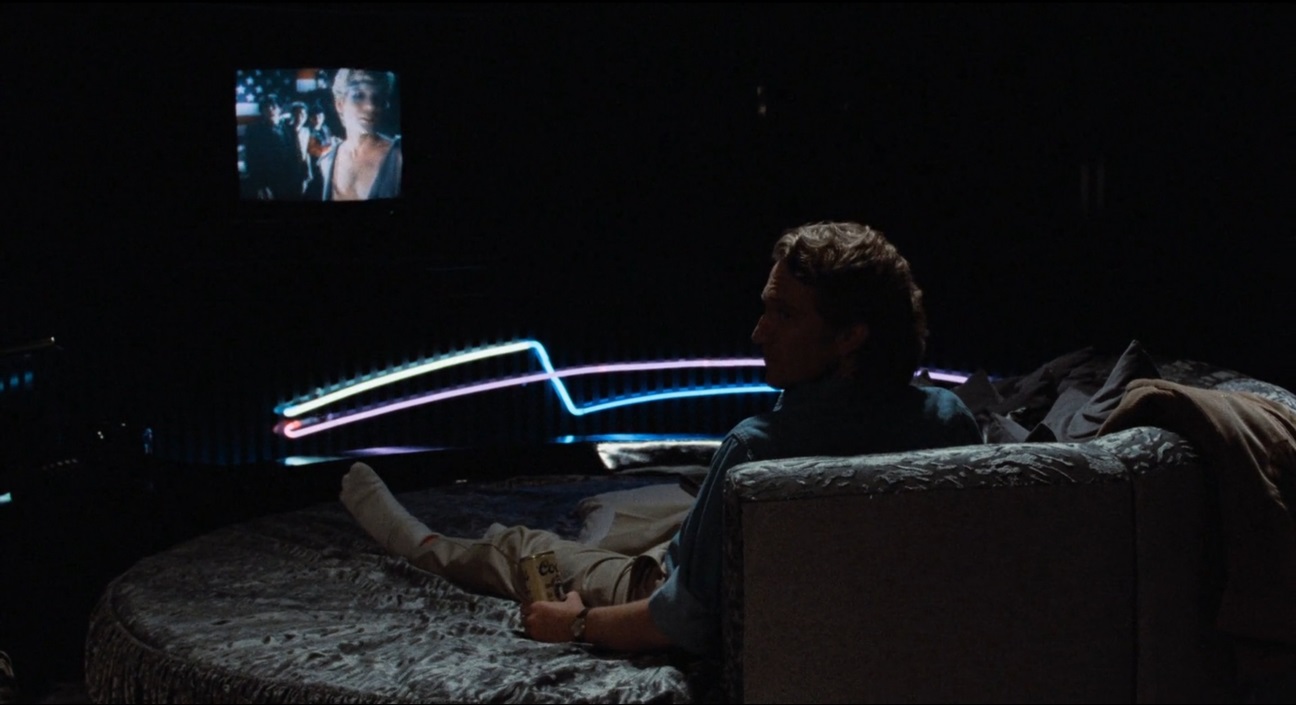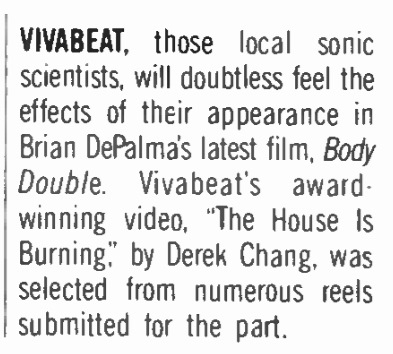"THE HOUSE IS BURNING" HAD WON MTV AWARD FOR BEST VIDEO FROM A NEW BAND


Before Jake Scully finds his way to Holly Body via Frankie Goes To Hollywood, he distractedly watches a music video on a TV in the house he's taking care of while his new actor friend is in Seattle. The song is "The House Is Burning (But There’s No One Home)" by the band Vivabeat, and the video, directed by Derek Chang, had won an MTV award for Best Video from a New Band. Vivabeat founder Marina Muhlfriedel had met Peter Gabriel in the late 1970's while working as entertainment editor at Teen magazine. Earlier this year, Muhlfriedel wrote an article about Vivabeat for Flood Magazine:
As soon as we wrote our first four songs, we booked time at an 8-track studio off Hollywood Boulevard and cut a new demo. I was ready to reconnect with Peter [Gabriel]. A month later, I went to England, and ringing him from my London hotel, Peter invited me to a party at his home in Bath the following evening. I invited my friend, Rich Barbieri, the keyboard player from the band Japan (now in Porcupine Tree), and he agreed to drive.It was magical—20 or so guests playing croquet by moonlight, surrounded by towering wormwood hedges and sipping peppermint tea. Saying goodbye late in the evening, I didn’t mention to Peter that I left the cassette demo in a fruit bowl on his dining room table.
Nonetheless, a month later, I received a pre-dawn morning call from Peter, introducing me to a jovial Brit named Tony Stratton Smith. Tony owned Charisma Records, the label for which Peter, Genesis, Monty Python, Van der Graaf Generator, among others, recorded. Strat, as he was known, said everyone in his office was whistling “Man From China” and that he had no choice but to take us under the “famous Charisma wing.” We became their first American signing.
This sort of thing did not happen, even in the ’80s. We knew dozens of bands, far more experienced and popular than us. Bands who struggled for years to get a second glance from a label. We played three gigs before suddenly finding ourselves at the Record Plant with Rod Stewart in the next room. We had clothing and equipment allowances. A famous director shot our first video. We signed with the William Morris Agency and were convinced we were on a trajectory to the big time.
Our first album, Party in the War Zone—featuring “Man From China”—came out in 1980. The song became a dance club hit in much of the world, and we got to lip-synch it at all the big gay discos. However, good fortune is often ephemeral. The fact that our first manager’s vanity license plate read “IM SPACED” should have rung a warning bell. It didn’t. Clueless, we forged ahead as he repeatedly dropped the ball. When two band members became heroin addicts and could barely perform, Charisma rejected our demos for a second album and dropped us from the label. And we dropped Connie and Alec from the band.
Soon, our drummer Doug crashed his motorcycle on Fountain Avenue. He was high with no helmet, and Mick found him listed as a John Doe in a coma at Cedars Sinai. He survived, but lost the use of three limbs.
Mick, Terrance, and I pulled together a funkier and more inventive version of Vivabeat with guitarist Rob Dean, who had been in the band Japan, and local session drummer Chris Schendel. We got another manager—and a record deal with Polygram—for a while. But while recording our next album, the manager went AWOL, not returning our calls. Once again, we were in rock ‘n’ roll limbo.
But all was not lost. A couple of dance club promoters released a limited-edition follow-up EP featuring a song called “The House Is Burning (But There’s No One Home).” The song became a European dance club hit and was picked up along with its video (which won an MTV award) to appear in the movie Body Double. Vivabeat was on track to live out a few more fab ’80s cocaine-fueled years, recording some of our strongest work yet. When Rob Dean left Vivabeat for Gary Numan’s band, Jeff Gilbert, a tech-brained San Francisco transplant who later became one of the wizards at Mackie, joined us.
Vivabeat never hit the great big time, but we got a whiff of its heady enchantment, making music we loved, going on the road with bands like Gang of Four, Human League, Depeche Mode, Gary Numan, Thompson Twins, and The B-52’s (R.E.M. opened for us). We also found a dream production partner in Earle Mankey, who got us like no one else.



